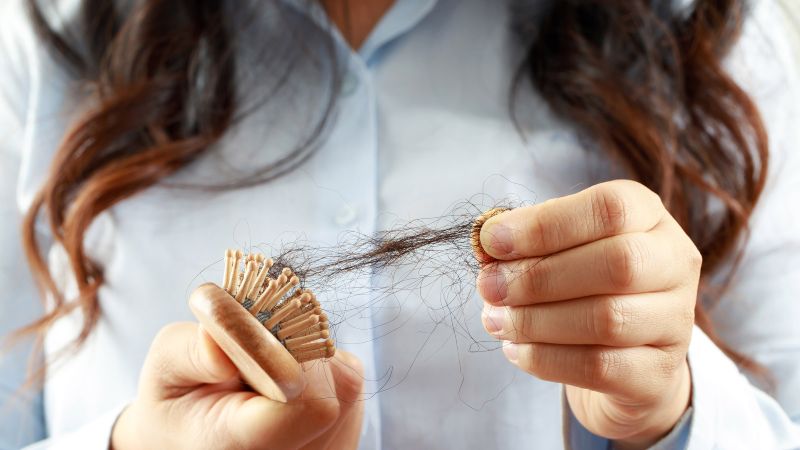What Causes Hair Loss?
I’m losing hair. Why? Hide in the brush, the shower drain, or on the pillow is in no way a cause for alarm. Every inch goes through its growth cycle before it eventually stops growing and falls out. It then grows back as the process starts over. While eyelashes or eyebrows only grow in about 150 days, the cycle of scalp hair might take many years. Everyone loses hair daily for this reason. A healthy adult should consume between 70 and 100 calories daily on average. Even though there should be more, pathological hair loss is not always mentioned.
Age-related hair loss is common and frequently genetic. The hair follicles in typical locations, such as the receding hairline in men, cannot exit the resting phase following the growth phase. No new hair grows after the existing hair has fallen out naturally.
When Should I See a Doctor If I’m Losing My Hair?
Age-related hair loss, which significantly affects young men, is the most prevalent. There is no need to see a doctor for this hair loss because there is no cure.
It might be beneficial if you see a doctor,
- If considerable amounts of hair fall out quickly (referred to as “tufts”), especially if the scalp also itches, with bald patches on the head, beard, or eyebrows that are easily identifiable.
- Birth control pills and several medications, including those used to treat cancer, rheumatism, depression, and heart issues, can also result in hair loss.
Hair loss can result from excessive hair styling when the hair is tugged or when the scalp is exposed to hot oils or allergic colors.
Which Treatment Prevents Hair Loss
There are frequently new products introduced that claim to stop hair loss. Yet, medical professionals warn against such self-care. First, most of these hair restorers do not appear to be effective at preventing hair loss and may also cause serious adverse effects. For instance, the active component finasteride, which many doctors have recommended for hair loss, can lead to severe depression and erectile dysfunction in patients, including impotence. A lot of the time, medical intervention is not necessary because hair loss can be transient or an inevitable aspect of aging.
Depending on the type and cause of the hair loss, therapy may or may not be required. The three main categories that medicine divides into are as follows.
Androgenetic Alopecia
The most typical type of hair loss is androgenetic alopecia, sometimes referred to as hereditary or male pattern hair loss. It results from this form in roughly 95% of instances. Dermatology believes that a specific male hormone is a culprit because of a genetic hypersensitivity (5alpha-dihydrotestosterone). This type of hormone can also impact women because it is present in small amounts in them.
But differently: whereas androgenetic alopecia causes hair loss in women, it first manifests in men as a receding hairline and can eventually result in total baldness. No therapy works.
Continual Hair Loss
A non-contagious scalp fungal infection may cause sudden hair loss and itchy skin on the scalp. If this is properly treated, the hair will grow back. Waiting too long may result in scarring and permanent hair follicle damage.
- As the hair on the scalp thins out gradually, it is said to be experiencing diffuse hair loss. There can be many distinct causes:
- Added outside influences such as excessive stress or sleep deprivation
- Vitamin insufficiency is possible, but with a balanced diet, it is almost nonexistent.
using medicine - x-rays
- infections
- thyroid conditions
- Hormonal changes, such as those that occur after discontinuing the pill and both during and after pregnancy
Hair Loss in Circles
Isolated bald spots on the head that swiftly expand are the typical beginnings of circular hair loss (alopecia region). In extreme circumstances, all of the body’s hair is impacted, and the hair eventually falls off. Circular hair loss is thought to be caused by a compromised immune system since, in this situation, the body’s defense cells target the cells in the hair roots. If this is the case, it has not been proven.
Treatment is challenging. The hair usually returns within a year in 80% of cases. There are numerous therapeutic modalities, but there is no proof that any of them are effective, partly because there are so many instances of spontaneous healing. With your doctor, you should discuss whether and how to receive treatment.
Conclusion
Genetic predispositions, changes in hormone levels, and specific medical conditions can all contribute to hair loss. The most frequent cause of hair loss, which affects up to 50% of men and women, is hereditary. Following delivery is another factor that promotes hair loss.
Also read: How to Increase Hair Growth in Men
Also read: Microcurrent Facials? Please say yes!
